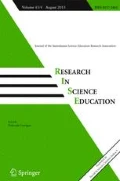Abstract
Aiming to encourage longitudinal studies in science education, we clarify conceptual and methodological aspects of longitudinal research. We use the studies that other articles in this issue describe to illustrate these aspects. The illustrations range from attempts to promote long-term change through experimental teaching to investigations that describe change without intending to affect it. For both experimental and descriptive studies we discuss the validity of conclusions and insights, and how threats to validity may be reduced or eliminated. We highlight implications for teaching and the curriculum, and for the conduct of research. We describe the practicalities of longitudinal research, referring to time, resources, management of data, and attrition of subjects, and end with a summary of reasons why longitudinal studies are valuable.
Similar content being viewed by others
References
Arzi, H. J. (1988). From short- to long-term: Studying science education longitudinally. Studies in Science Education, 15, 17–53.
Arzi, H. J., & White, R. T. (2003, August). The time dimension in teacher education: Perspectives from a longitudinal study of science teachers. Paper presented at the 10th biennial conference of the European Association for Research on Learning and Instruction, Padova, Italy.
Benbow, C. P., & Minor, L. L. (1986). Mathematically talented males and females and achievement in the high school sciences. American Educational Research Journal, 23(3), 425–436.
Campbell, D. T., & Stanley, J. C. (1963). Experimental and quasi-experimental designs for research on teaching. In N. L. Gage (Ed.), Handbook of research on teaching (pp. 171–246). Chicago: Rand McNally.
Shulman, L. S., & Tamir, P. (1973). Research on teaching in the natural sciences. In R. M. W. Travers (Ed.), Second handbook of research on teaching (pp. 1098–1148). Chicago: Rand McNally.
White, R. T. (2001). The revolution in research on science teaching. In V. Richardson (Ed.), Handbook of research on teaching (4th ed., pp. 457–471). Washington, DC: American Educational Research Association.
White, R. T., & Tisher, R. P. (1986). Research on natural sciences. In M. C. Wittrock (Ed.), Handbook of research on teaching (3rd ed., pp. 874–905). New York: Macmillan.
Author information
Authors and Affiliations
Corresponding author
Rights and permissions
About this article
Cite this article
White, R.T., Arzi, H.J. Longitudinal Studies: Designs, Validity, Practicality, and Value. Res Sci Educ 35, 137–149 (2005). https://doi.org/10.1007/s11165-004-3437-y
Issue Date:
DOI: https://doi.org/10.1007/s11165-004-3437-y



